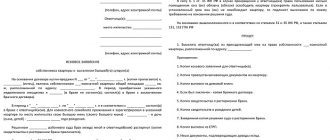Kick out your ex-partner once or twice: when you can and when you can’t
Legal illiteracy and excessive arrogance are the hallmarks of many men and women in divorce. “I have nowhere to go after the breakup. If I stay where I was, I’ll ruin the life of my ex at the same time,” that’s what they think. When is such behavior illegal? There are several cases when the ex-spouse should say “Thank you!” that he has not yet been kicked out and things thrown out of the window. A divorced partner cannot live in a shared apartment by law if this apartment simply does not belong to him. In this case, he can be asked to pack his bags at any time.
When is eviction not possible?
Our desires do not always coincide with our capabilities. If your ex-spouse lives in the same territory with you and does not think of leaving the premises, there may be the following legal grounds:
- they are the sole owners of the apartment, or they own a share of it;
- the apartment was registered in their name before marriage, but the deed of gift was not issued in your name;
- the property was gifted to the ex-wife or husband during the marriage;
- the housing was transferred to the ex-wife or husband by inheritance;
- another gratuitous transaction was carried out with the ex-husband or wife.
If you do not own a share of the apartment, you did not buy it together with your ex-partner during marriage, then you should be the one to worry about a new place of residence. Downloading rights is now a lost cause. If everything is exactly the opposite, you can start a war for the right to remain in your corner alone.
Eviction methods
It would seem easy to evict an ex-wife or husband from your own apartment. The person should be reminded of his rights and responsibilities and enjoy the spectacle of furiously packing his suitcases. But if all former partners realized the truth and voluntarily left their home after a divorce, then you would not now be looking for the answer to the question of how to drive away an uninvited neighbor. So, there are two ways to evict former spouses from an apartment:
- Voluntary. Constructive dialogue and a farewell slam of the door - this is the ideal eviction of an ex-partner. After this, it’s not a sin to throw a party, but there are not many cases of voluntary departure of an ex-husband or wife. All decent and conscientious people run away on their own without talking or reminding. And those who are more insolent do not want to lose their free place of residence and look for a new one. And it’s too expensive to remove a corner these days. Therefore, we want to warn you that you should not hope for such a favorable outcome of events. And whoever is forewarned is forearmed.
- Forced. If the ex-husband prefers not to listen to his wife’s monologues about a speedy eviction, and still watches TV casually, scattering sandwich crumbs around, then it’s time to bring in the heavy artillery. Contact the court with a request to forcibly evict the person from your apartment. The ex will receive a couple of reminders from the court, and if he doesn’t get it, gentle bailiffs will come and lead him away.
See also:
Valuation of movable and immovable property during divorce: tips, recommendations, generalizations
Remember that you can only try to evict your spouse from the apartment if you are its rightful owner. If the housing belongs to both of you, you need to divide the property and decide what to do with the property - sell it and divide it, or you will give the value of your spouse’s share in cash.
Step-by-step eviction of ex-husband or wife
Admiring the face of your wife or husband every day after a divorce is still a pleasure. A nervous atmosphere in such a situation is guaranteed for you, because conflicts are unlikely to be avoided. Have you gathered your strength and are ready to kick your ex-partner out of the apartment? If you are absolutely sure of your decision and you are the sole owner of the property, then you should not continue to endure an unpleasant neighborhood. How to quickly and effectively remain in splendid isolation? We offer you the following algorithm of actions:
- An attempt to peacefully resolve the issue. Constructive dialogue is the best way to evict your ex, but it is not always effective. Try to discuss the problem clearly and thoughtfully, even if you have already done it hundreds of times. Give arguments, highlight the prospect of litigation and threaten with bailiffs. Who knows, maybe right now the husband or wife will realize their mistake, pack their things, call a taxi and give you the keys without scandals.
- Applying to court with a statement of claim. If a person refuses to leave the premises voluntarily, then strict measures will have to be taken, that is, filing a lawsuit in court. First you need to collect the necessary documents: copies of passports, apartment purchase and sale agreements, a copy of the divorce certificate and marriage contract, if any, an extract from the house register and the Unified State Register, receipts for payment of utilities and state fees in the amount of 200 rubles. Then you need to draw up a statement of claim indicating the name of the court, full name of the plaintiff and defendant. The statement also indicates the reasons for the disagreement and their demands. At the court hearing, you must clearly argue your position and present compelling arguments for your ex-lover to be evicted from your home. Surely the defendant will also prepare for the process and find something to counter your claim. The court will listen to both of you and only then make a fair decision.
- Waiting for a court decision. A final verdict usually takes approximately three months. The first two of them are occupied by preliminary hearings, since the defendant often does not appear for hearings. In the last month, the court comes to a final decision and announces it to the plaintiff and defendant, if they are present. Under favorable circumstances (the ex-spouse owns an apartment and has a sufficient level of income), the court usually rules to vacate the property within a week. If a person has nowhere to go and no means of subsistence, the eviction period is extended to 12 months.
- Appeal with the court decision to the Department of Internal Affairs of the Ministry of Internal Affairs of Russia. If your ex is not registered in the apartment and it does not belong to him, then the question of how to evict him should not worry you much. He has no right to live there, which means that the judicial authorities will quickly find justice for him. How to evict a registered ex-husband or wife from an apartment? To do this, you need to go through one more instance and apply with the court decision to the Department of Migration Affairs of the Ministry of Internal Affairs of the Russian Federation (Department for Migration Issues). In accordance with the court order, employees must deregister the person and send a notice of this.
- Sending notice of eviction and its terms. The court and the Department of Internal Affairs of the Ministry of Internal Affairs of the Russian Federation will notify the defendant about the timing of the eviction and all the nuances of this process. When vacating the apartment, the ex-partner needs to remove all of his large items, as well as his pets. He must organize cargo transportation at his own expense.
- Contact the FSSP. The last authority and the toughest are the bailiffs. If even a notice from the court does not encourage your ex-husband or wife to leave your home, contact the Federal Bailiff Service. Then its employees will come and lead the unwanted tenant out under the white hands, and all you have to do is wave after him.
See also:
Options for dividing a municipal apartment
It’s good if evicting an insolent neighbor does not cause you any particular difficulties. But there are situations when this is quite difficult or even impossible to do. We will now talk about such narrow cases.
The lawyer achieved the cancellation of the decision to evict the trustee from the apartment sold without her consent
The Seventh Court of Cassation of General Jurisdiction published a reasoned ruling in a civil dispute in which a man sold an apartment acquired during marriage and owned jointly, without the consent of his ex-wife.
Circumstances of the dispute
Tatyana and Vladimir Zykov filed a claim against Alsu Mansurova in the Kogalym City Court of the Khanty-Mansiysk Autonomous Okrug - Ugra. Referring to Art. 209, 304 of the Civil Code of the Russian Federation, they asked the court to oblige the defendant to stop actions that impede their exercise of ownership of the apartment and to move out of there. The plaintiffs motivated their demands by the fact that they are the owners of the disputed housing, but cannot use it, since the defendant occupied the apartment without legal grounds, citing a power of attorney issued to her by the former owner, Sergei Semyonov (the power of attorney has now been revoked).
Alsu Mansurova, in turn, filed a counterclaim against the Zykovs, as well as Olesya Kirichenko and Sergei Semenov, to invalidate the purchase and sale agreements, cancel the entries in the Unified State Register of Real Estate and apply the consequences of the invalidity of the transactions (AG has the statement of claim). The plaintiff explained that the apartment was purchased by her and Sergei Semyonov during their marriage and is joint property. On September 7, 2010, the marriage was dissolved, there was no dispute about the division of joint property, the ex-spouses decided to use the apartment together, and in the future to re-register it to their son.
Since in 2006 Semyonov was transferred to work in another city and from that time lived there, after the divorce he issued a power of attorney for Mansurova to manage the apartment, which he canceled on July 14, 2021.
In 2021, Mansurova filed an application with the magistrate for a court order to collect child support from Semenov, which caused the relationship between the former spouses to go wrong.
In mid-October of the same year, Semenov informed Mansurova of his intention to sell the apartment, and also that he would sell it even if his ex-wife refused to give notarized consent. Mansurova replied that she would not give consent and would go to court with a claim to divide the apartment into shares, intending to exercise the right of pre-emption to acquire a share.
In November 2021, she filed a claim with the Kogalym City Court for recognition of ownership of the apartment, in which she asked to be allocated a ½ share and to terminate the joint ownership regime. In the same lawsuit, the plaintiff asked for interim measures in the form of a ban on performing registration actions with the apartment. She informed her co-owner about this.
On November 7, 2021, the application was returned due to a violation of the rules of jurisdiction. Mansurova was explained that the claim should be filed at the defendant’s place of residence. The appeal upheld the ruling of the first instance. At the beginning of January 2021, the plaintiff appealed to the Surgut City Court - at the place of residence of her ex-husband.
On January 28, 2021, Sergei Semenov informed Alsu Mansurova about the new owner of the apartment, Vladimir Zykov, and demanded to vacate the apartment within 10 days. The next day, the woman sent a photo of a statement of claim against Semyonov to Zykov’s phone number for the division of jointly acquired property, indicating that the issue of the apartment they were purchasing was being considered in court. On February 1, 2021, Tatyana Zykova told Mansurova over the phone about a conversation with a lawyer, who explained that since they were purchasing the apartment not from Semenov, but from Olesya Kirichenko, Mansurova could only count on funds that she had the right to recover from Semenov. The Zykovs decided not to suspend the deal.
Then Mansurova found out that Kirichenko was involved in the deal, and contacted the Kogalym City Department of Internal Affairs with a statement of crime under Art. 159 of the Criminal Code of the Russian Federation.
On February 4, 2021, Alsu Mansurova applied to the cadastral chamber to suspend the transaction, but was refused due to the fact that she was not a party to it.
On February 13 of the same year, a decision was made to refuse to initiate a criminal case under Art. 159 of the Criminal Code, according to which, during the inspection, Vladimir Zykov was interviewed, explaining that from 2018 to 2021, he and his wife decided to purchase an apartment, for which they contacted a real estate agency. They were offered a controversial apartment, but it turned out that the owner was on a business trip. In January 2021, realtor R. called Zykov and said that the owner had arrived and was ready for a deal.
“As can be seen from the said resolution, not about any owner of the apartment in the person of O.E. Kirichenko. Zykov did not mention it, he referred to the owner of the apartment, and not to the landlady. Thus, he knew that the apartment was actually being sold not by O.E. Kirichenko, but by S.V. Semenov. Moreover, after registering the sale and purchase transaction, defendant Kirichenko O.E. she did not try to move into the apartment, the apartment remained in her ownership for only three weeks, after which it was sold by Zykov,” Mansurova emphasized in her counterclaim.
“It is obvious that, without obtaining consent to sell the apartment, Semenov S.V. and Kirichenko O.E. planned a purchase and sale transaction with the aim of approving a subsequent transaction with Zykov Bank, since back in December 2021, realtors Semenov S.V. and Kirichenko O.E. were informed that the Zykovs intended to purchase an apartment with a mortgage, and, accordingly, the latter assumed that the bank would thoroughly check the apartment to ensure there was no dispute,” the document noted.
In addition, it was indicated that as a result of unfair actions of all parties to the sales contracts, Mansurova’s rights were violated. Thus, the defendants became reliably aware of the existence of a dispute on January 29, 2021, and the transfer of ownership of the apartment was registered in the Unified State Register of Real Estate on February 7.
The counterclaim also emphasized that Mansurova learned about the violation of her right in October 2021, and therefore filed a lawsuit to determine the shares in the right to the property. Due to the fact that Kirichenko and the Zykovs knew about the existence of a dispute between the former spouses regarding the use of the apartment, they, according to the plaintiff, cannot be recognized as bona fide purchasers, and transactions for the alienation of the disputed apartment should be declared invalid.
Mansurova asked to invalidate the agreements for the purchase and sale of an apartment concluded between Semyonov and Kirichenko, as well as between the latter and the Zykovs, as well as to cancel the entries in the Unified State Register of Property Rights and apply the consequences of the invalidity of these transactions, returning the parties to the original position that existed before the violation of her rights .
The first instance came to the conclusion that there was no evidence of dishonest behavior of buyers
In court, Tatyana Zykova explained that they bought the apartment the second time, since the first time the realtor R. said that the owner could not come, and the second time they met the owner - Olesya Kirichenko - for the first time at the bank when transferring money.
January 29, 2021 The Zykovs arrived at the apartment and found it locked from the inside. In the evening, Mansurova invited them to meet, but Tatyana Zykova refused, citing the fact that the apartment belonged to her. Since Mansurova did not participate in the transaction, nor was she listed on the certificate of persons ever registered in the apartment, and they purchased the property from Olesya Kirichenko, Zykova perceived Mansurova’s behavior as dishonest. A day or two before registering the transaction, Tatyana Zykova explained to the court, they received a call from the registration chamber and were informed about Mansurova’s claims to the apartment. The registration chamber, in turn, explained to the Zykovs that the transaction can only be canceled with the consent of all its participants. They did not know that the registration of the transaction could be suspended. Tatyana Zykova asked her claim to be satisfied and her counterclaim to be rejected.
According to the testimony of Sergei Semenov, since the apartment was not “divided” and the statute of limitations had expired, he believed that the apartment completely belonged to him. The realtor asked him to give a notarized statement that the apartment was not purchased during marriage, but the man refused and the deal did not take place.
Sergei Semyonov discussed the situation with his colleagues, and Olesya Kirichenko expressed a desire to buy this apartment for cash for her son. Some time after the purchase, she said that circumstances had changed and the property needed to be sold, and asked for help. Semyonov recommended that she contact a real estate agency. He asked the court to reject Alsou Mansurova’s claim.
Having studied the case materials, the court noted that the sale and purchase agreements disputed by Mansurova were concluded on December 7, 2021 and January 25, 2019 - i.e. when she and Semyonov divorced. Thus, the possession, use and disposal of common property, determined by the provisions of Art. 35 of the RF IC, were terminated, and the former spouses acquired the status of participants in joint property, regulated by the norms of the Civil Code of the Russian Federation.
The court indicated that based on the provisions of paragraphs 2 and 3 of Art. 253 of the Civil Code, when resolving a dispute regarding the recognition of a transaction for the disposal of common property made by one of the participants in joint ownership as invalid, the following circumstances are subject to establishment: the presence of the participant in joint ownership of the authority to dispose of the common property and the awareness of the other party to the transaction that this participant does not have the appropriate powers, taking into account which the other party should have known about the illegality of his actions.
The first instance noted that since Alsou Mansurova is challenging the transaction made by her ex-husband to dispose of the disputed apartment, it is she who must prove Olesya Kirichenko’s bad faith in terms of her awareness of Sergei Semyonov’s lack of authority to dispose of the apartment.
At the same time, as follows from the testimony of witness T., a senior detective officer of the OEBiPK OMVD of Russia for the city of Kogalym, who conducted an inspection at the request of Mansurova and interviewed Kirichenko, in an oral conversation the latter explained that she agreed to act as a fictitious buyer of the apartment, since Semenov’s ex-wife behaved incorrectly. Kirichenko refused to give written explanations, citing Art. 51 of the Constitution of the Russian Federation.
“Taking into account the above, the court cannot, as evidence of the dishonest behavior of Kirichenko O.E. accept the testimony of witness T., since in accordance with the procedure established by law it is recorded that from giving explanations during the interview Kirichenko O.E. refused, the fact of giving oral explanations by T. on the merits of the dispute Kirichenko O.E. “I denied it at the hearing,” the court concluded.
The first instance indicated that evidence of Kirichenko’s awareness of Mansurova’s appeal to the court, given that the claim was returned, and Kirichenko was not a party to the dispute over the division of property between Semenov and Mansurova, was not presented by the plaintiff’s side in the counterclaim. At the same time, Art. 38 of the RF IC does contain a rule that a three-year statute of limitations applies to claims for the division of common property of spouses whose marriage is dissolved.
Is it possible to evict an ex-wife and child?
When you are the owner of a home, driving out your ex-wife will not be difficult. But having a common child radically changes things, since the child has the right to a share of the property of either parent. Also, a minor can live in his father’s apartment, even if the parents have already divorced. This circumstance does not give the ex-wife the right to be there, but if the child is too young (under one year old), then, as a rule, the court takes this circumstance into account in favor of the woman. And then the husband cannot kick her out, and sometimes she is not even allowed to divorce.
During the trial, a decision may be made on the temporary residence of the mother in the apartment of her ex-husband along with the child. Within the established time frame, the woman is supposed to find another place of residence and work. If this is not possible, and the father pays child support, he may be required to find housing for his ex-wife and their common child, which is not inferior in terms of conditions to the current one. This is how the law protects the rights of minors.
If the ex-wife, with whom she has a common child, owns some kind of housing or can be sheltered by close relatives, then the court will most likely side with the husband.
It is possible to evict an ex-wife with a small child, but is it worth doing? It is difficult for a single mother to get a job, and finding a place for a child in a nursery is a real problem. Financial problems are also a big obstacle to finding a rented apartment: you can’t really get around on maternity leave. Try to take a responsible attitude towards the fate of your child and take into account all the circumstances of the situation before going to court.
See also:
How to divide a car during a divorce
Is it possible to evict an ex-husband from an apartment?
This question may arise before a woman after she has divorced her husband, no matter how much time has passed since the date of divorce. After all, some married couples coexist quite peacefully in the same living space. And in some cases, husbands themselves leave the apartment to their ex-wife, not wanting to waste their time and nerves. This question can be answered in the negative only in two cases:
- the husband was the owner of the apartment (or its share) before marriage, and when living together, did not draw up a deed of gift for his wife;
- the husband inherited an apartment, regardless of whether this happened before legal marriage or not.
In other words, if during the marriage the wife only had the right to use her husband’s apartment, then the ex-husband will not be evicted.
Example. In 2010, Zuev V.P. entered into marriage with Gaeva I.R. and from that time on they began to live in a rented apartment. After 5 years, Zuev V.P. received an inheritance in the form of a four-room apartment and the couple moved into it. In 2021 Gaeva I.R. decided to divorce her husband, filed a claim in court for divorce and division of jointly acquired property, including an apartment. Zuev V.P. filed a counterclaim against his wife to evict her from the apartment due to the loss of grounds for residence and the court fully satisfied his demands, citing the fact that property received during marriage in accordance with the rules of inheritance law is not jointly acquired.
In all other cases, the ex-husband can be evicted under certain circumstances. It is better if this happens voluntarily, but often you still have to contact the judicial authorities.
Eviction of a former partner from a privatized apartment
Before you begin to act, you need to decide when and by whom the apartment was privatized. If this procedure is completed before marriage, then the former spouse does not have any right to live in it. Privatization of an apartment in marriage, registered only in your name, also deprives your ex-partner of the right to live there if he is not registered in it. In both cases, you need to act according to the standard: try to talk peacefully and ask the person to move out. In case of refusal, apply to the court and other authorities for eviction according to the law.
The legal process will go much faster if the ex-partner does not live in a privatized apartment for a long time, evades paying alimony, or leads an antisocial lifestyle. Such arguments clearly speak in favor of his eviction.
You will not be able to evict your ex-husband or wife from an apartment if privatization was registered in the name of both of you. In this case, after the divorce, the share of the housing is due to both spouses, and the issue of exchanging the apartment or reimbursing the value of its share in monetary terms will have to be decided in court.
Legal status of the apartment
When evicting a former spouse, the court will first look at the legal status of the property. In the Russian Federation there are the following types of property use:
- Private property.
- Municipal property.
Each type has its own laws and separate requirements.
Privately owned
Private property is considered to be real estate that was received by individuals into possession by concluding a purchase and sale agreement, by deed of gift, inherited or privatized. Private property can be rented from another individual under a rental agreement.
Having ownership rights to real estate means that the owner can move into the apartment and register any person into it.
To perform such an action, one reason is sufficient - the permission of the owner. But for eviction, a completely different scheme works and cannot be done without compelling reasons. Divorce is considered a serious reason for the ex-spouse to be discharged.
A delay in evicting an ex-husband or wife from his own apartment may occur if he has no other place to live. This reason cannot oblige the owner to forever provide shelter to a stranger, but the court has the right to delay the deportation for three or more months.
All of the above actions cannot be performed if the divorced person has a share in this apartment. Even the owner can be deprived of the right to reside, but this requires other compelling reasons; divorce is not one.
Municipally owned
Municipal property belongs to the state housing stock, not to private individuals. It is provided to citizens in need of housing. Such living space is provided on a rental basis. An open-ended social tenancy agreement is concluded with the tenant, in which there is one responsible tenant. This document contains information about all citizens registered on the territory of the municipal premises. However, unlike private property, all residents of a social apartment have equal rights, and even a responsible tenant is such only on paper, but does not have special privileges or exclusive rights.
Only relatives of the responsible tenant can be registered in a municipal apartment. The spouse is a family member and can be registered in the premises and included in the social tenancy agreement. But if the marriage is dissolved, it will be difficult to evict him; often this will not be possible, since he is considered an equal tenant and cannot be discharged only because of divorce. Even the court will be on the side of the ex-spouse and will refuse the demands.
Eviction from a municipal apartment
Municipal housing belongs to the state and is given to people for use on the basis of a social tenancy agreement. Beneficiaries (military, orphans, veterans, victims of Chernobyl, displaced persons and other citizens with similar problems) can get such an apartment. Only those persons specified in the contract and their families can live in municipal housing.
After the divorce, only the tenant remains in the municipal apartment. However, if the housing is registered in the name of both spouses in a marriage and they are both registered in it, then they will have to resolve the issue with local authorities. If the ex-partner does not violate the rules of residence, then it will be very difficult to kick him out of the shared municipal apartment. It is possible to fulfill a request for the provision of two municipal housing premises, but this is granted extremely rarely, and only in exceptional cases. Therefore, it is worth trying to resolve the issue peacefully to avoid unnecessary delays.









